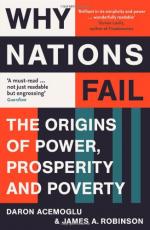|
This section contains 440 words (approx. 2 pages at 400 words per page) |

|
Inclusive Institutions
Inclusive institutions are political and economic institutions that are responsive to the interests of the public as a whole. These include democratic governments and market economies.
Extractive Institutions
Extractive institutions are political and economic institutions that are responsive only to the interests of a social and political elite and that exploit and oppress the people as a whole. These include absolute monarchies, modern Latin American and African dictatorships and authoritarian governments like China.
Critical Junctures
Critical junctures describe periods in history where a country is able to choose to move in a more inclusive or extractive direction.
Institutional Drift
Institutional drift is the process by which institutions evolve, often guided by critical junctures. Institutional drift tends to move in an extractive or inclusive direction.
Virtuous Cycles
Virtuous cycles are cycles of inclusive institutions leading to increasingly inclusive institutions. Virtuous cycles are hard to produce and hard...
|
This section contains 440 words (approx. 2 pages at 400 words per page) |

|




